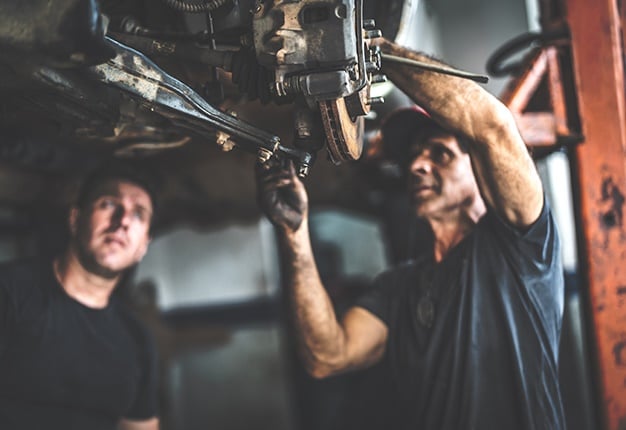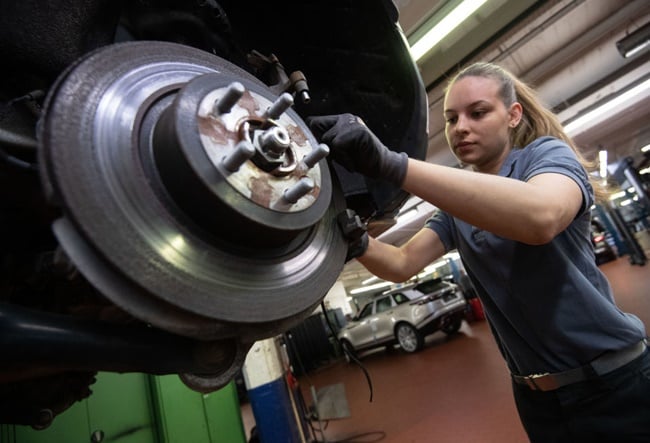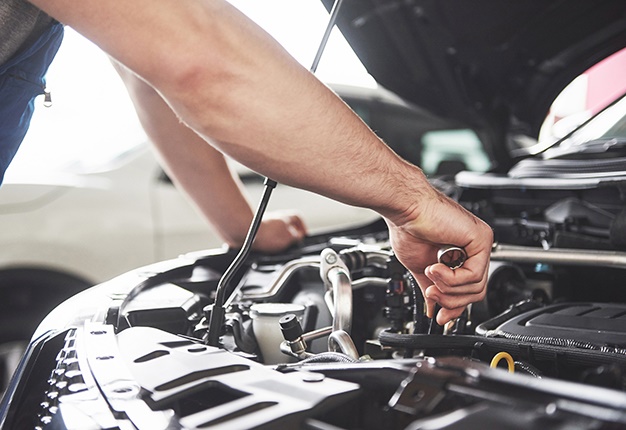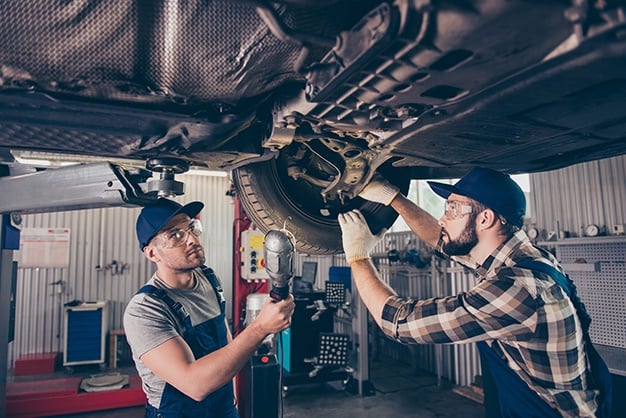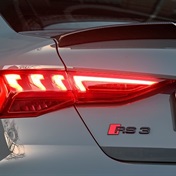• We list 14 items that are likely to fail on older cars.
• Car owners have indicated that they are likely to keep their vehicles for 5 - 10 years.
• The challenging economic times are playing a role in owners' decision.
• For more motoring stories, go to www.Wheels24.co.za
While vehicle sales in South Africa are on the up, several owners will not be too keen on selling their vehicles due to the trying economic times. Many have lost their jobs because of Covid-19 and the ensuing lockdown, while others had to take a pay-cut and make do with a lot less come month-end.
The uninspiring situation has led to most people not being too keen to depart from their vehicles and will we see a fair amount of owners clinging to their cars for more extended periods. According to research done by the Automobile Association, 90% of South Africans will keep their vehicles for longer periods, with 40% of that ninety inclined to keep the car for between five to ten years.
Car mechanic (iStock)
14 items to keep your hand on
While you will save money on monthly repayments, you run the risk of mechanical breakdowns. If you are planning on keeping your vehicle for long after it's been paid off, best you keep the following maintenance tips in mind.
• Timing belts: The belt's teeth can sheer off, or it can snap in two or more pieces, leading to catastrophic engine failure and costly full engine rebuild. Warning signs: Loss of power or loud rattling/knocking noise. Complete engine shut down.
• Brake system:
Brake pads can wear down completely, damaging brake discs and leading to complete loss of braking power. Warning signs: Grinding noise of metal to metal, preceded by an apparent loss of brake fluid due to a drop in the brake fluid level - a clear indication that the brakes are worn down.
Brake hoses or brake system seals: Leaking or ruptured hoses and seals can lead to brake system failure. Generally intended for a five-year service life. Warning signs: Deterioration can lead to blockages and or leakages at joints as well as either a spongy or hard pedal feel with limited stopping effect.
Brake fluid: Absorbs moisture during use, which reduces the resistance to heat during braking and can lead to brake failure. The brake system can also deteriorate internally, requiring costly refurbishment. Brake fluid is considered old at the 2-year mark. Warning signs: Brake fade (the vehicle takes longer to stop). Spongy pedal feel or hard pedal feel. Dirty black appearance of the brake fluid in the reservoir.
Are you driving a car that's older than five years and out of warranty? Email and share you maintenance hacks and headaches with us.
A car mechanic changes a brake disc (Marijan Murat / Getty Images)
• Radiators and radiator hoses: Numerous heating and cooling cycles could see the radiator and hoses deteriorate and fail. Resultant overheating could lead to engine failure. Warning signs: The temperature gauge is in the red. Hissing sound from the radiator cap. Hoses can display signs of bulging or collapse. A loss of power may also be experienced.
• Alternators: Failure means that the battery and the electrical system won't be kept at the necessary charge, leading to electrical failure. Warning signs: Loud screeching noise from the alternator if its bearings are failing. The vehicle's charge/battery light may be on constantly. The vehicle may also struggle to start.
• Water pumps: Failure will result in insufficient circulation of the coolant in the engine, causing the engine to overheat and, if not rectified, engine failure. Warning signs: Elevated temperature reading on the temperature gauge. Signs of water leakage at the front of the engine.
• Shock absorbers: Failure will cause an inability to control the vehicle efficiently. Generally designed for a service life of approximately 80 000km. Warning signs: Poor ride quality. Reduced directional stability, increased braking distance, nosediving when stopping, poor handling and increased tyre and brake wear. Fluid leaking from the shock absorbers.
• CV joints: The CV can collapse, causing the vehicle not to move and require removal and replacement. It's best to replace CV joints on both sides of the vehicle. Warning signs: A loud clacking sound will be heard at low speed when turning sharply.
• Clutches: A slipping clutch will not allow the gearbox to engage fully with the engine, leaving limited or no drive. Poor driving skills, such as riding the clutch, make a clutch wear faster. Warning signs: Shuddering on pull away, the engine revs without the vehicle accelerating.
Car mechanic (iStock)
• Engine and gearbox seals: Failure leads to loss of lubricant and engine or gearbox seizure. Warning signs: Oil leaks from the front or rear of the engine, or rear of the gearbox. High oil consumption. Oil dripping onto the road surface. Total loss of lubricant.
• Starter motors: Bearings wear out over time, causing increased effort to turn the engine and, very quickly, a flat battery. Warning signs: The engine will turn sluggishly and take time to start, with symptoms similar to those of a flat battery, even when the battery is still charged.
• Oil pumps: Failure means insufficient lubricant to the engine, parts seizing/engine failure. Warning signs: The oil pressure gauge or oil level warning light will indicate low oil pressure. It's imperative to stop immediately.
• Engine & gearbox mountings: Failure results in the engine and gearbox not being kept in their correct position/alignment, causing damage to engine and gearbox parts. Warning signs: Engine - a loud knocking sound or vibration on start-up and pull away. Gearbox – a knocking sound or vibration during pull away and gear changes.
• Wheel bearings: The wheel bearing can disintegrate and cause the hub assembly to detach from the vehicle. Literally: the wheel coming off, resulting in no steering control. Warning signs: A shudder in the steering wheel during braking or cornering is an early warning. A good shake of the wheel top to bottom with the wheel jacked up off the ground will indicate a slight knocking feel or sound as well.
• Universal joints (in vehicles with rear or all-wheel drive): Failure will lead to the prop shaft dropping out of the vehicle, causing severe damage to the rear differential ('diff') and other undercarriage parts. Warning signs: A vibration through the floor of the vehicle at speed. This is similar to the symptoms of bad wheel balancing, which should be eliminated first.
Wynand van Vuuren is insurer King Price's partner of client experience.
Car mechanic (iStock)
Disclaimer: Wheels24 encourages freedom of speech and the expression of diverse views. The views of contributors/columnists published on Wheels24 are therefore their own and do not necessarily represent the views of News24 or Wheels24.




 Publications
Publications
 Partners
Partners




